新概念英语第三册第二单元语法与句型
- 格式:doc
- 大小:24.00 KB
- 文档页数:1


in短语in surprise, in ink, in pencil, in common, in difficulty, in the end, in bed, in all, in a hurry, in debt, in love, in sight, in danger, in tears非谓语在句中可以做除谓语外所有成分,主、宾、定、状、补、表、同。
Armed with a torch, the vicar went up into the clock tower to see what was going on.Looking at his watch, he saw that it was one o’clock, but the bell struck thirteen times before it stopped.分词做状语特点:两个动作,同一个主语,其中一个动作用分词表示,可以使句子更加紧凑,简洁。
非谓语被称为无缝粘合剂。
谓语动词强调:You certainly did give me a surprise!强调句的十种结构:1.用助动词"do(does/did)+动词原形"来表示强调:Do write to me when you get there.你到那儿后务必给我来信。
2.用形容词very,only,single,such等修饰名词或形容词来加强语气:How dare you buy such expensive jewels?你怎么敢买这么贵的宝石呢?3.用ever,never,very,just等副词和badly,highly,really等带有-l y的副词来进行强调:I really don't know what to do next.我的确不知道下一步该怎么做。
4.用in the world,on earth,at all等介词短语可以表达更强的语气(常用于疑问句):Where in the world could he be?他到底会在哪儿?5.用感叹句来表示强烈的感情,突出说话人的情感:How interesting a story it is!这是一个多么有趣的故事啊!6.用重复来表示强调:Why!why!The cage is empty!啊!啊!箱子是空的。
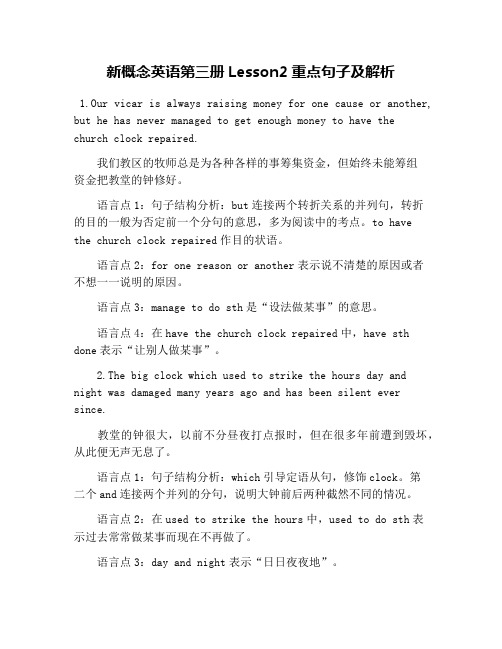
新概念英语第三册Lesson2重点句子及解析1.Our vicar is always raising money for one cause or another, but he has never managed to get enough money to have the church clock repaired.我们教区的牧师总是为各种各样的事筹集资金,但始终未能筹组资金把教堂的钟修好。
语言点1:句子结构分析:but连接两个转折关系的并列句,转折的目的一般为否定前一个分句的意思,多为阅读中的考点。
to havethe church clock repaired作目的状语。
语言点2:for one reason or another表示说不清楚的原因或者不想一一说明的原因。
语言点3:manage to do sth是“设法做某事”的意思。
语言点4:在have the church clock repaired中,have sth done表示“让别人做某事”。
2.The big clock which used to strike the hours day and night was damaged many years ago and has been silent ever since.教堂的钟很大,以前不分昼夜打点报时,但在很多年前遭到毁坏,从此便无声无息了。
语言点1:句子结构分析:which引导定语从句,修饰clock。
第二个and连接两个并列的分句,说明大钟前后两种截然不同的情况。
语言点2:在used to strike the hours中,used to do sth表示过去常常做某事而现在不再做了。
语言点3:day and night表示“日日夜夜地”。
3.One night, however, our vicar work up with a start:the clock was striking the hours!一天夜里,我们的牧师突然被惊醒了,大钟又在“打点”报时了!语言点1:句子结构分析:however表示转折。
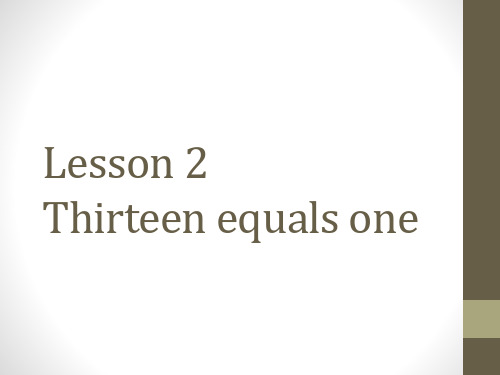

【导语】新概念英语作为家喻户晓的经典之作,它有着全新的教学理念,有趣的课⽂内容及其全⾯的技能训练,为⼴⼤的英语学习者提供帮助!如果你也想学好英语,⼜怎能错过新概念英语?下⾯为您提供了相关内容,希望对您有所帮助! 1、Was the vicar pleased that the clock was striking? Why? Our vicar is always raising money for one cause or another, but he has never managed to get enough money to have the church clock repaired. 现在进⾏时和 always 等频度副词搭配时:表⽰说话⼈带有某种的情感⾊彩 Tom is always doing homework. 汤姆总是做家庭作业,怎么也做不完。
Tom always does his homework. 汤姆总是做家庭作业,不拖⽋作业。
He is always making noises. 他总是吵吵闹闹,真烦⼈。
one or another:表⽰这样或那样 -- for one reason or another 处于这样或那样的原因 -- at one time or another 在这样或那样的时间 -- in one way or another ⽤这样或那样的⽅法 get enough money to do sth 募集⾜够的资⾦做某事 -- I have to get enough money to have my house repaired. have something done 1>找某⼈来做某事 -- have the church clock repaired -- have the plane repaired / -- have hair cut 2>某⼈所遭受到的意外某种情况(主语必须是发出动作的⼈) -- His wallet was stolen. → He had his wallet stolen. 2、The big clock which used to strike the hours day and night was damaged many years ago and has been silent ever since. used to:过去常常做,⽽现在不再发⽣的事情了 -- He used to smoke every day. 3、One night, however, our vicar woke up with a start: the clock was striking the hours! However -- 在⼝语中, 主要⽤于句⾸;在作⽂中, 好⽤在句中、句尾。
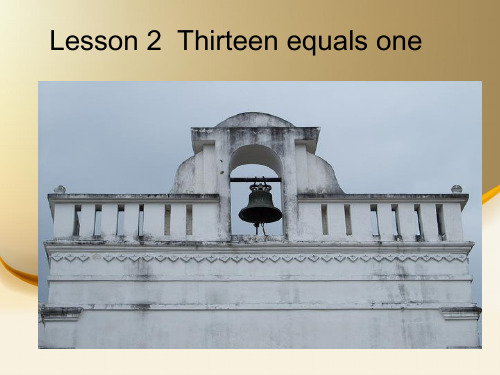

新概念3句型总结.doc新概念英语第三册句型总结引言《新概念英语第三册》是一套旨在提高学习者英语阅读、写作、听力和口语能力的教材。
本文档将对第三册中的句型进行详细总结,帮助学习者更好地理解和运用英语句型。
第一部分:句型概述1. 简单句定义:只有一个主语和一个谓语的句子。
例句:She is a student.2. 并列句定义:使用并列连词(如and, but, or等)连接两个或多个简单句。
例句:He tried to phone me, but I was out.3. 复合句定义:包含一个主句和一个或多个从句的句子。
例句:Although he is old, he is still very active.第二部分:主要从句类型1. 名词性从句定义:在句子中充当名词的角色。
例句:What he said is true.2. 定语从句定义:修饰名词或代词的从句。
例句:The man who is talking to John is my uncle.3. 状语从句定义:表示时间、地点、原因、目的、结果等的从句。
例句:If it rains, the match will be postponed.4. 条件状语从句定义:表示条件的从句。
例句:Unless we act now, we will miss the opportunity. 第三部分:特殊句型1. 虚拟语气定义:用来表达假想、愿望或不太可能发生的情况。
例句:If I were you, I would accept the offer.2. 强调句型定义:通过倒装或某些特定结构来强调句子的某一部分。
例句:It was not until I got home that I realized I had forgotten my keys.3. 疑问句定义:询问信息的句子。
例句:Have you finished your homework?4. 否定句定义:含有否定意义的句子。

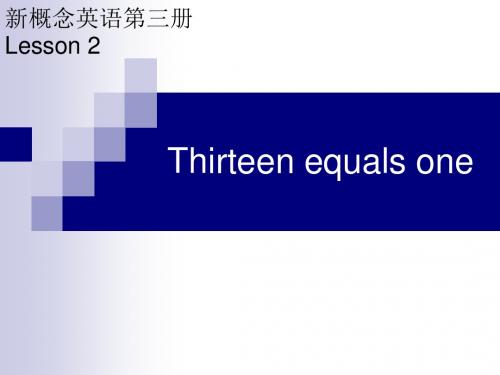

Lesson 2 Thirteen equals one一、单词讲解New words and expressionsequal ['i:kwəl] v.等于vicar ['vikə] n.牧师raise [reiz] v. 募集,筹(款)torchlight ['tɔ:tʃlait] n.电筒光Equal v. / adj. 与…相等1)adj. 与----相等;(be equal to)eg. Wealth is not equal to happiness. 财富不等同于幸福。
EEOC:Equal Employment Opportunities Commission 平等就业委员会(A US government organization whose aim is to make sure that people are not prevented from getting jobs because of their race, religion, age, sex etc, and to make sure that all workers are treated fairly and equally.) EEOC 是美国的一个政府型机构,它主要是致力于确保不同的种族,不同的宗教信仰,不同的年龄和性别等,不会在就业机会上有任何差异,并且确保所有的就业人员被公平与平等的对待。
中国学生易犯的错误:2)vt. 及物动词equal to: (X )("to" is unnecessary )所以‘equal’后面不用加‘to’因为它是及物动词。
vicar 英国教区的小牧师(of the Church of England)rector: of the Catholic Church 小牧师priest 神父(但特别是罗马天主教教堂里的神父) curate 副牧师curate's egg 有好有坏eg. The book is something of a curate's egg. 这本书好坏参半。

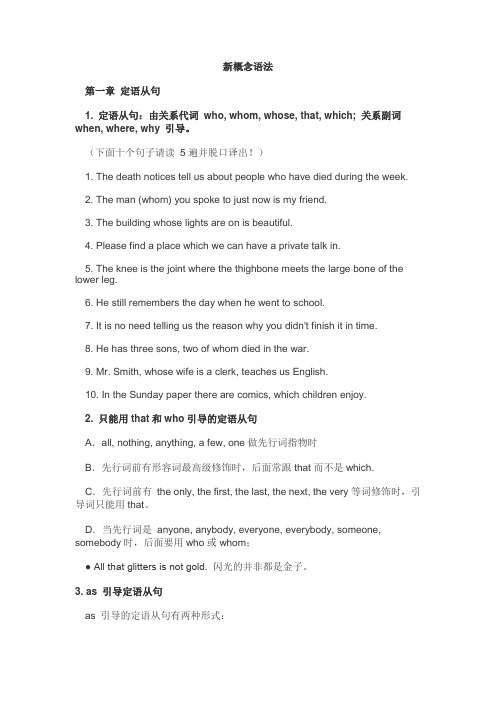
新概念语法第一章定语从句1. 定语从句:由关系代词who, whom, whose, that, which; 关系副词when, where, why 引导。
(下面十个句子请读5遍并脱口译出!)1. The death notices tell us about people who have died during the week.2. The man (whom) you spoke to just now is my friend.3. The building whose lights are on is beautiful.4. Please find a place which we can have a private talk in.5. The knee is the joint where the thighbone meets the large bone of the lower leg.6. He still remembers the day when he went to school.7. It is no need telling us the reason why you didn't finish it in time.8. He has three sons, two of whom died in the war.9. Mr. Smith, whose wife is a clerk, teaches us English.10. In the Sunday paper there are comics, which children enjoy.2. 只能用that和who引导的定语从句A.all, nothing, anything, a few, one做先行词指物时B.先行词前有形容词最高级修饰时,后面常跟that而不是which.C.先行词前有the only, the first, the last, the next, the very等词修饰时,引导词只能用that。

新概念英语第三册语法新概念英语第三册语法精讲及练习<二>:虚拟语气摘要:新概念英语第三册语法精讲及练习.虚拟语气用来表达不可能或难以实现的愿望,与事实相反的假设,通常分为基本的三种形式.新概念英语第三册语法精讲及练习虚拟语气用来表达不可能或难以实现的愿望,与事实相反的假设,通常分为基本的三种形式.1. 与现在事实相反的虚拟:If + did / were + ..., ... wouldshouldcould + do <动词原形>mightIf I were you, I would go abroad at once. <I am not you.> If he knew it now, he could help me. <He doesn't know it now.>2. 与过去事实相反的虚拟:If + had done + ..., ... would <might> have done ...If I had known your telephone number yesterday, I would have phoned you.<I didn't know your telephone number.>If you had come here a littleearlier just now, you might have met her.<You didn't come here earlier.>3. 与将来事实相反的虚拟:<1> If + should + v., ... would + v.<可能性很小><译作"万一">If it should rain tomorrow, you could stay at home.If I should fail, what should Ido?<2> If + did / were to + v ..., would + v.<完全不可能>If the sun were to rise in the west, I would lend you themoney.If you finished it in 3 minutes, I would give you my car.4. 金牌特殊重点:!![简单联想记忆]:● 下列动词后的"宾语从句"中需要用虚拟形式,即should + 动词原形,shoud在美国英语中要省略<TOEFL语法考点>.此类常见的动词有:order, ask, decide, demand, require, recommend, suggest<建议>insist<坚决要求>,advise, etc.例句:He suggested that we <should> help them with English.The teacher ordered that the homework <should> be finished within half an hour.● 下列名词后的同位语从句中要用"should + 动词原形"<should可省去>的虚拟.suggestion, order, request, demand, importance, proposal.He made a suggestion that we <should> have a fancy dress party.I think it is a thing of importance that it <should> be done soon.● It is / was important / necessary / natural / essential / advisable / strange / surprising, ect. + that +主语+ should + v.It is strange that you should say such a thing.It was important that you should tell me all the information.● wish后的宾语从句中,as if 后的状语从句中,须用下列的虚拟形式:主 + wish+ <that> + 主 + did / were<指现在>haddone<指过去>would+ v.<指将来>Iwishthat I met my uncle now.IwishI had met my uncle yesterday.IwishI could meet my uncle tomorrow.测试精编:选择正确选项:1. I ________ he had taught me the word, but he didn't.A. believeB. hopeC. wishD. think2. The man in charge recommends that this matter ________ at the meeting.A. would be discussedB. will be discussedC. be discussedD. may be discussed3. It is raining now, otherwise we ________ go out play.A. couldB. canC. mayD. will4. ________ he come late, give him the message.A. HadB. ShouldC. WouldD. Did5. Hadn't my car broke down, I ________ the train.A. would have caughtB. might catchC. could catchD. would catch6. I would have helped him if I had time, but I ________.A. haven'tB. hadC. didn'tD. wouldn't7. The dam was built in time to protect the inhabitants from the flood; ________.A. otherwise the damage would be beyond measure.B. the damage, otherwise, should be very great.C. the damage could have been very serious otherwise.D. the damage caused, therefore, many of them homeless.8. It is natural that an employee ________ his work on time.A. finishesB. finishC. can finishD. finishs9. I would go abroad but that I ________ poor.A. amB. wasC. shall beD. were10. Don't act as if you ________ the only pebble on the beach.A. areB. wereC. have beenD. would be1. C2. C3.A4. B5.A6. C7. C8. B9.A 10. B新概念英语第三册语法精讲及练习<三>:代替与省略摘要:新概念英语第三册语法精讲及练习.英语中,为了避免不必要的重复,经常用so, not, to, do, does 代替前面出现的动词或相关内容新概念英语第三册语法精讲及练习英语中,为了避免不必要的重复,经常用so, not, to, do, does 代替前面出现的动词或相关内容.如:He translated the article better than I did. <did代替wrote it>— Doyou think she isclever?— I think so. <so代替 she is clever><1> 从上两例中看出,do / does / did 代替动词.<2> "so 与 not" 代替某个词、短语、句子等,通常用于hope, think, believe, expect, suppose, be afraid, fear, imagine, etc 后作宾语.E.g. — Is it correct?— I'm afraid not. <not correct><3> "to" 用作不定式,常跟随下列动词:want, mean, hope, expect, refuse, seem, intend, be, afraid, etc.E.g. I asked him to go to the party, but he refused to. <go to the party><4> "do so, do that, do it" 用来代替动态动词,而不能代静态动词.Eg. — He gave up studying English.— Why did he do so? <= give up studying English>— The dish tastes nice.— Yes, so it does. <tastes nice><此句不能用it does it 或 it does so, 因taste属静态动词.><5> 为使语言精炼,避免不必要的重复,对话中常用省略形式.E.g. — He is thinking of buying a car?— Is he?<这里,"thinking of buying a car"被省略了.>— Will he come back in time?— Perhaps.<省略了he will come back in time.>测试精编:1. — Shall I wake you up tomorrow? — Yes, ________ .A. please doB. you shallC. you willD. you may2. I think records are often ________ an actual performance.A. as good as or better thanB. as good or better thanC. like good or better thanD. as good as any other3. —If he doesn't come to work, he may be fired. —Surely he isn't so foolish ________ not to realize that.A. soB. andC. butD. as4. — Don't you think Alan's health has beenruined by smoking? — Yes, he told me ________ himself.A. the factB. this thingC. ItD. so5. — Will you go home tomorrowevening? — No, I'm going to a lecture, or at least, I'm planning ________ .A. onB. toC. soD. It6. — I slipped on the stairs, I think my arm is broken. — Oh! I ________ .A. do not hope soB. do not hopeC. hope not soD. hope not7. California relies mainly on income from fruit crops, and ________ .A. Florida alsoB. Florida tooC. Florida is as wellD. so does Florida8. — Have you been here long? — ________ .A. No, not veryB. Not muchC. Yes, only littleD. No, only yesterday9. — You look happy today, Mary. — I like my new dress and mother ________, too.A. doesB. likesC. isD. do10. — So you are lost, little boy. Why didn't you hang on to your mother's skirt?— ________, but I couldn't reach it.A. I hanged toB. I did toC. I didn't hang toD. I tried toKey:1.A2.A3. D4.D5. B6. D7. D8.A9.A 10.D摘要:新概念英语第三册语法精讲及练习.根据语法要求,把谓语动词置于主语前,称为完全倒装,把助动词或情态动词置于主语前,称为部分倒装.新概念英语第三册语法精讲及练习倒装根据语法要求,把谓语动词置于主语前,称为完全倒装,把助动词或情态动词置于主语前,称为部分倒装.1.副词如:in, out, down, there, here, off, over, away, etc. 句子倒装.<完全倒装,但主语不能是代词>Down jumped the murderer from the tenth floor.In came Miss Green.<特别注意:当主语是人称代词时不倒装.>Away she went!<她走了!>Here you are!<你在这儿!>2.only + 副词<介词短语>位于句首,句子要倒装.Only then did he realize that he was mistaken.Only by working hard can we succeed in doing anything.3.well, so, often, such, few, little 放于句首,句子形成倒装.So fine was the weather that we all went out lying in thesun.Well did I know him and well did he know me.4.否定词或具有否定意义的词及词组用在句首时,句子须倒装.此类词有: neither,nor,hardly,scarcely,rarely,seldom,not,never,not only,barely,at no time,nowhere 等.e.g. — Jack could not swim.— Neither could Tom.Never have I seen such a good movie.5.as引导让步状语从句,须倒装.<准确地说,是将需要强调的词提到as的前面.>Rich as he is, he spends a cent on charity.Try as he does, he never seems able to do the work beautifully.6.在表示祝愿的句子中.May you make greater progress! <愿你取得更大进步!>7.在虚拟条件句中,连词if省略时,句型要倒装,即将were, had, should等词提到句首.Were I you, I would go abroad to take advanced study.我要是你,就出国进修了.Should he come tomorrow, he would help us to settle the problem.他要是明天来的话,他会帮我们解决这个问题的.8.百分特例重点:Much as we may pride ourselves on our good taste, we are no longer free to choose the things we want.<NCE Book III Lesson 26>尽管我们为自己的绝好鉴赏力感到自豪,但我们已经无法自由地选择我们所需要的东西了1. Not until the mid-nineteenth-century discovery of vast deposits of borate's in the Majave Desert ________ relativelyA. borax becameB. did borax becomeC. and borax becomeD. borax's becoming2. ________ received law degrees as today.A. Never so many women haveB. Never have so many womenC. The women aren't everD. Women who have never3. ________ the Bob's belongings that he carried them ina bundle slung over his shoulders.A. Were so fewB. Few were soC. So few wereD. They were so few4. Only after a baby seal is pushed into the sea by its mother ________ to swim.A. how will it learnB. will it learn howC. it will learn howD. and it learns how5. Not only ________ a promise, but he also kept it.A. did he madeB. he madeC. did he makeD. he makes6. Nowhere in the world ________ .A. travelers can buy so much beauty for so little as in Hawaii.B. no one can buy so much beauty for so little money as Hawaii.C. so much beauty can be bought for so little money in Hawaii.D. can travelers buy so much beauty for so little money as in Hawaii.7. No sooner ________ gone home than it began to rainA. had IB. have IC. I hadD. I have8. Not for a moment ________ the truth of your story.A. he has doubtedB. he doubtsC. did he doubtD. he did doubt9. ________ succeed in doing anything.A. Only by working hard we canB. By only working hard we canC. Only by working hard can weD. Only we can work hard10. Never before in similar circumstances ________ .A. a British Prime Minister had refused to step down.B. did a British Prime Minister have refused to step down.C. a British Prime Minister did have refused to step down.D. had a British Prime Minister refused to step down.1. B2. B3. C4. B5. C6. D7.A8.C9. C 10. D新概念英语第三册语法精讲及练习形容词定义:形容词是用来修饰名词的词,描述名词的性质、外观、特点等.功能:形容词可以做定语、表语或补助语.分类:主要分为两类:描绘性形容词和限定性形容词.● 描绘性形容词主要用来描绘大、小、新旧、颜色、质量等.● 限定性形容词主要用来限定所修饰词的数量、距离及X围所属等.1.当形容词修饰单数可数名词时,必须与冠词连用:a lovely girl, the naughty boy2.形容词可与系动词连用,做表语,说明主语的性状.常用系动词有:be,become,seem,appear,feel,look,taste,smell,sound, remain,go,turn,keep,stay, etc.The dish tastes delicious.The music sounds sweet.The milk went bad.小心陷阱 feel,smell,taste,look,keep有时可以用作实义动词,并可以用副词修饰.He looked me up and down carefully.I tasted the soup slowly to see whether it was salty.3.形容词用作后置定语.<简单理解:一般的形容词修饰名词时放在名词前面,但有些形容词修饰名词时放在名词的后面>a river navigable<一条可通航的河>sight visible可见的景象person responsible<负责人>注意:responsible person<有责任心的人>the best way possible<尽可能好的办法>the number necessary<必要的数量>the people present<在场的人>4.只能作表语的形容词1.某些表示健康状况的形容词.well<身体好的>,ill<病的>,faint<虚弱的>,poorly<身体不好的>示例:His mother has been ill for a long time.特别注意:sick是个特例.它既可做表语,又可做定语.He is sick for a couple of days.<他病两三天了>He is a sick person.<他是个病人.>2.某些以 a-开头的形容词.如:afraid<害怕的>,alone<独自的>,alive<活着的>,asleep<睡着的>,awake<醒着的>,aware<意识到的>The old man is alone in the house.<老人一个人在家.>The teacher is alive with enthusiasm.<这位老师热情洋溢.> He is asleep in his mother's arms.<他在母亲的怀抱中睡着了.>I have been aware of the difficulty.<我已经意识到了困难.>. The Chinese food served in American restaurant is not bad but I prefer ________.A. Chinese food authenticallyB. Chinese authentic foodC. food Chinese authenticallyD. authentic Chinese food2. ________ lessons were not difficult.A. Our first few short EnglishB. Our few first short EnglishC. Our few first English shortD. Few our first English short3. — Do you think that the Labor bill will be passed? —Oh, yes, it's ________ that it will.A. almost surelyB. very likelyC. near positiveD. quite certainly4. — Have you traveled much? — No, I have done ________ traveling.A. fewB. littleC. smallD. less5. —I was very busy. —Did you really work hard ________?A. all dayB. all the dayC. all the day longD. all of day long6. —Do you need anything from the store? — ________ and some cheddar cheese.A. Only a French bread loafB. A French bread loaf onlyC. Only a loaf of French breadD. A loaf of French bread only7. According to the information, the newly-constructed highway is said to be ________.A. lengthy twenty milesB. length about twenty milesC. about twenty miles longD. in twenty miles of length8. Mr. Smith has done ________ business here.A. a lot ofB. a number ofC. muchD. lots9. —Are you helping to organize the political convention? — I'm in charge of welcoming the ________.A. out-of-town visitorsB. visitors from outside of townC. visitors out-of-townD. outside town visitors10. — Does Jane have brown hair? — Yes, In fact, it's quitesimilar in shape ________ yours.A. asB. withC. likeD. to1.D2.A3. B4. B5.A6. C7.C8.A9.A 10.D新概念英语第三册语法:反意疑问句摘要:新概念英语第三册语法:反意疑问句1.一般用法:He is a student, isn't he?He isn't a student, is he?<1> "have to, had better, used to"要用下列方式反问:He has to finish the work, doesn't he?They used to smoke, didn't / usedn't they?You'd better get up immediately, hadn't you?<2> "has, have"作为助动词和实意动词,反问形式不同.We have done all the work, haven't we?You have some time, don't you?2. "seldom, barely, hardly, scarcely, few, little" 语意本身是否定,因此反意问句应为肯定形式.She seldom comes to visit us, does she?He hardly knew it, did he?3.当主句为祈使句,反意问句提出要求,命令应用 "will you"Do it at once, will you?但如表示邀请,劝告,反意问句用 "won't you"Have a cup of tea, won't you?4.否定祈使句应用 "will you" 来反问.Don't open the window, will you?5. "Let's" 短语● 当其为肯定形式,"shall we" 提出反问Let's play basketball, shall we?● 当其为否定形式,"all right, ok" 提出反问Let's not go to the party, all right?● 如为 "let us ..." 其反问形式应为 "will you" 提出请求Let us go home, will you?6.当 "think, suppose, consider, believe" etc 被用作为主句谓语动词,其后带有宾语从句时,反意疑问问句应与从句保持一致.I don't think that he is an honest man, is he?许多句子在描述一个人或一件物品时往往会出现一系列修饰语;动词的修饰语, 即副词往往也会几个同时使用,构成平行结构,平行结构要求语法结构须保持一致,如:1.系列动词:After school, we sang, danced and played the piano in the classroom.2.系列形容词:She is slim, tall, blond and beautiful.3.系列副词:The students are listening to me carefully and eagerly.平行结构不仅包括动词,形容词,副词,也包括分词,不定式,动名词,名词短语和句子等的平行用法,务必提高辨别力.易混淆的动词1. rise,raise,arise,arouse"rise" 是不及物动词,过去式为rose,过去分词为risen,其基本词义"上升,上涨".The sun rises in the east.A good idea rose in my mind. "raise" 是及物规那么动词,"举起,提高".He raised his voice to make himself heard.The boy can raise the heavy stone."arise",是不及物动词,过去式为arose,过去分词arisen,其语义为"出现,发生" .His curiosity arose due to the question his mother asked."arouse"是及物动词,过去式和过去分词为aroused,其语义为"唤醒,引起"arouse somebody from sleep 把某人唤醒arouse suspicion 引起怀疑2. lay,lie,lie"lay"及物动词,"放置,生蛋",过去式与过去分词为 "laid"I've laid the book on the self.The hen lays an egg every day."lie"不及物动词"位于,平躺",过去式为"lay"过去分词 "lain"He lay on the floor and slept soundly.Beijing lies in the north of China."lie"及物动词"说谎",它是规那么动词.He lied to his teacher.3. sit,seat"sit"不及物动词,过去式与过去分词均为 "sat".He sat in the classroom reading newspaper."seat"及物动词,"使就坐""容纳".He seats himself here.He is seated there.He seats the baby on his knees.The hall will seat 5000 people.4. affect,effect"affect" 及物动词,"对……有影响,感动,触及"The relations between then will be affected."effect" 及物动词, "导致,造成,带来〔变化〕,产生"The changes in methods effected some improvement in his study.5. hang <hanged, hanged> / <hung, hung>当 hang过去式与过去分词为 "hanged",其含义是"绞死";而当hang的过去式与过去分词为"hung"时,其含义是"悬挂".The man was hanged for murder.He hung his coat on the hook.6. borrow,lend"borrow"借入 "borrow sth. from ...""lend"<lent, lent> 借出 "lend sb. sth" 或 "lend sth. to sb."7. take,bring,fetch"take"<took, taken> 及物动词"拿走""bring"<brought, brought> 及物动词"带走""fetch" 及物动词"去取回来"1. receive,accept"receive" 客观上收到"accept" 主观上愿意接受I received his gift, but I wouldn't like to accept it.2. fit, suit"适合""fit" 指"尺寸"的适合"suit" 指"款式,花样等"的适合The dress doesn't fit me. It is too long.Blue is the color that suits her well.3. answer, reply "回答""answer" — vt."reply" — vi 须和 "to"连用"You needn't know it." He answered.So far, they haven't answered / replied to our questions.4. spend, cost, take "花费""spend" <spent, spent> 花"时间,金钱"主语须是人.He spend 5 hours writing the article."cost" <cost, cost> 花费"金钱,时间,劳力"可接双宾,主语须是"物".The book cost me $20 and 2 days."take" 通常指花"时间"主语须是"某种事情".It takes me 20 minuter to go to school.The work took me longer than I expected.5. assure,ensure"assure" 使放心 assure sb. of sth.assure sb. that...I can assure you of my honesty."ensure" 保证 ensure sth.〔其后不能接人称〕ensure thatensure doing sth.I can ensure his safety.He ensured that he finished the job in time.He ensured coming back later.百分重点:如ensure 含义为"保护,使安全",其结构为:ensure sb from / against sth.He ensured the boy from drowning.6. beat, defeat, win — vt."beat" <beat, beaten> 战胜,打败比赛,辩论中的对手He beat John at chess yesterday."defeat""击败"敌军,入侵者,整个球队They defeated the enemy in that battle."win" <won, won>"赢得比赛"win over sb.〔赢了某人〕The football team won the match.7. damage,destroy,hurt,spoil,wound,injure以上六个词中,"hurt" 可作及物,不及物动词外,其余五个均为及物动词."damage" ——损坏〔害〕〔有修复的可能性〕"destroy" ——摧毁,打破〔希望,计划〕毁灭〔无修复的可能性〕"hurt" ——伤害〔感情或身体某一部位〕痛疼"spoil" ——破坏,糟蹋〔晚会,旅游,参观等〕宠爱,惯怀〔孩子〕"wound" ——使受伤〔枪伤,刀伤〕"injure" ——使受伤Don't spoil your son too much.The man has destroyed the girl's life all her hopes.Some houses were damaged in the earthquake.I don't mean to hurt you.He was injured in the accident.It was dangerous because he was wounded seriously in the war测试精编1. His newly-published novel is quite a success ________a good income from the reading public.A. ensuring himB. assuring himC. assuring him ofD. assuring him about2. My watch ________ five o'clock.A. saysB. tellsC. speaksD. talks3. "He has been working very hard recently." "Because the burden of a big family has been ________ on his shoulder."A. bearB. borneC. bornD. bore4. The visiting delegates were urged to ________.A. talk at libertyB. state their open mindsC. make individual expressionsD. speak freelyKEYS1.C2.A3. B4.D代替与省略英语中,为了避免不必要的重复,经常用so, not, to, do, does 代替前面出现的动词或相关内容.<1> 从上两例中看出,do / does / did 代替动词.He translated the article better than I did. 〔did代替wrote it〕— Do you think she is clever?— I think so. 〔so代替 she is clever〕<2> "so与not" 代替某个词、短语、句子等,通常用于hope, think, believe, expect, suppose, be afraid, fear, imagine, etc 后作宾语.— Is it correct?— I'm afraid not. <not correct><3> "to" 用作不定式,常跟随下列动词:want, mean, hope, expect, refuse, seem, intend, be, afraid, etc.I asked him to go to the party, but he refused to. <go to the party><4> "do so, do that, do it" 用来代替动态动词,而不能代静态动词.— He gave up studying English.— Why did he do so? <= give up studying English>— The dish tastes nice.— Yes, so it does. <tastes nice>〔此句不能用it does it 或 it does so, 因taste属静态动词.〕<5> 为使语言精炼,避免不必要的重复,对话中常用省略形式.— He is thinking of buying a car?— Is he? 〔这里,"thinking of buying a car"被省略了.〕— Will he come back in time?— Perhaps. 〔省略了he will come back in time现在完成时:1.构成:have / has + 过去分词2.功能:〔1〕表示过去所发生的动作对现在的影响或产生的结果.常与yet, just, before, recently, lately〔最近〕, ever, never等表时间的副词搭配使用.He hasn't seen her lately.I haven't finished the book yet.〔2〕表示一个从过去某个时间开始,延续到现在并可能持续下去的动作,常与表示一段时间的时间状语连用.如:so far〔迄今为止〕, up till now〔直到现在〕, since, for a long time〔很长时间〕, up to present〔直到现在〕, in the past / in the last few years 〔在过去的几年里〕, these days〔目前〕……He has worked here for 15 years.I have studied English since I came here.The foreigner has been away from China for a long time.So far, I haven't received a single letter from my brother.〔3〕某些非延续性动词〔即:动作开始便终止的动词〕,在现在完成时中不能与表示一段时间状语搭配.黄金要点:I.常见的非延续动词:die, arrive〔到达〕, join〔加入〕, leave 〔离开〕, go, refuse〔拒绝〕, fail〔失败〕, finish, buy, marry, divorce〔离婚〕, awake〔醒〕, buy, borrow, lend ... 〔背三遍!〕II.这类动词并非不能用现在完成时,而是不能接常由for引导的时间状语.III.但若是用在否定句中,非延续动词的现在完成时可以与表示一段时间的状语连用.She has gone away for a month.〔误〕She has been away for a month 〔正〕The man has died for two years.〔误〕The man has been dead for two years.〔正〕How long have youbought the book?〔误〕How long have you got the book.〔正〕〔4〕注意 since的用法:They haven't had any trouble since they came here.It has been ten years since we met last time.He has been here since 1980.He has been here since ten years ago.几组对比:He has gone to Shanghai. 他到##去了.He has been to Shanghai. 他去过##.She has gone. 她已走了.She is gone. 她缺席了.〔或者她死了.〕The door has been closed. 门关上了.〔动作〕The door is closed. 门是关着的.〔状态〕测试精编1. The prices ________ going up all the time in the past few years.A. keepB. keptC. have keptD. are keeping2. For the whole period of two months, there ________ no rain in this area.A. isB. will beC. has beenD. have been3. Today is Jane's wedding day. She ________ John.A. have just married withB. was just married toC. has just been married toD. just has been married to4. No wonder the flower have withered, they ________ any water for ages.A. hadn'tB. haven'tC. haven't hadD. hadn't had5. Nowadays computer ________ a wide application with the development of production and science.A. foundB. has foundC. findsD. had foundKEYS1. C2. C3. C4. C5. B虚拟语气用来表达不可能或难以实现的愿望,与事实相反的假设,通常分为基本的三种形式.1. 与现在事实相反的虚拟:If + did / were + ..., ... would/ should/ could/ might + do 〔动词原形〕If I were you, I would go abroad at once. <I am not you.> If he knew it now, he could help me. <He doesn't know it now.>2. 与过去事实相反的虚拟:If + had done + ..., ... would <might> have done ...If I had known your telephone number yesterday, I would have phoned you. <I didn't know your telephone number.> If you had come here a little earlier just now, you might have met her. <You didn't come here earlier.>3. 与将来事实相反的虚拟:<1> If + should + v., ... would + v. 〔可能性很小〕〔译作"万一"〕If it should rain tomorrow, you could stay at home.If I should fail, what should Ido?<2> If + did / were to + v ..., would + v. 〔完全不可能〕If the sun were to rise in the west, I would lend you the money.If you finished it in 3 minutes, I would give you my car.[简单联想记忆]:下列动词后的"宾语从句"中需要用虚拟形式,即should + 动词原形,shoud在美国英语中要省略〔TOEFL语法考点〕.此类常见的动词有:order, ask, decide, demand, require, recommend, suggest 〔建议〕, insist〔坚决要求〕, advise, etc.He suggested that we <should> help them with English.The teacher ordered that the homework <should> be finished within half an hour.下列名词后的同位语从句中要用"should + 动词原形"〔should 可省去〕的虚拟.此类常见的名词有:suggestion, order, request, demand, importance, proposal.He made a suggestion that we <should> have a fancy dress party.I think it is a thing of importance that it <should> be done soon.It is / was important / necessary / natural / essential / advisable / strange / surprising, ect. + that +主语+ should + v.It is strange that you should say such a thing.It was important that you should tell me all the information.wish后的宾语从句中,as if 后的状语从句中,须用下列的虚拟形式:主 + wish+ <that> + 主 + did / were〔指现在〕had done〔指过去〕would+ v.〔指将来〕I wish that I met my uncle now.I wish I had met my uncle yesterday.I wish I could meet my uncle tomorrow.It is <high> time that ... + did / were ...It is time that you went to bed.would rather that ... + did / were ...I would rather that you were not here now.would sooner that ... + did / were ...I would sooner that you got up earlier.I would sooner that you were not my brother独立主格结构此独立形式只是一个小短语,而不是主谓完整的简单句,又称之为独立分词构句.当分词意义上的主语不是主句的主语时,必须在分词前保留意义上的主语,否那么语意不通.示例:Being ill in bed, I can't go to school.Mother being ill in bed, I can't go to school.1.独立主结构形式可用以表时间,理由,条件,伴随状态等.He lay on the grass, the sun shining upon him.= He lay on the grass, and the sun was shining upon him.Weather permitting, I'll start tomorrow.= If weather permits, I'll start tomorrow.School being over, the boys went home.= When school was over, the boys went home.The sun having set, we arrived at the station.= After the sun had set, we arrived at the station.王牌重点:当独立主格结构的主语表示"一般人",如:we, one, you时,主语可省略,此用法常用于下列表达方式中:generally speaking 一般来说strictly speaking 严格地说talking of ... 谈到speaking of ... 说到judging from ... 由……来判断taking all things into consideration 把一切都考虑在内considering ... 考虑到……[示例]If we judge from his face, he must be ill.= Judging from his face, he must be ill.He has lots of books if we consider that he is young.= He has lots of books, considering that he is young.2.with 复合结构也是独立主格结构形式之一.这种结构在句中作状语〔表示原因,方式,伴随等〕和定语,作定语时紧随被修饰名词后.<1> with+ 名词 + 介词短语The woman with a baby on her back is my sister.The boy rushed into the room, with his schoolbag in his hand.<2> with + 名词 + adj.with the door open, he left the classroom.<3> with + 名词 + adv.With the gloves off, she felt cold.With the lights on, the building looks beautiful.<4> with + 名词 + 现在分词〔主动〕with + 名词 + 过去分词〔被动〕With the guide leading us, we got to the village.The boy was crying with the vase broken.<5> with + 名词 + 不定式With the hard work to be done, we have to prepare for it.。

新概念第三册l2知识点总结一、词汇。
1. thrust (v.)- 意思:猛推;冲;刺。
例如:He thrust his hands into his pockets.(他把双手插进口袋里。
)- 常用搭配:thrust sth. into/at sb./sth.(将某物猛力插入/刺向某人/某物)。
2. abandon (v.)- 意思:抛弃;放弃;放纵。
例如:They abandoned the sinking ship.(他们放弃了正在下沉的船。
)- 相关短语:abandon oneself to sth.(沉溺于某事),如:He abandoned himself to despair.(他陷入绝望之中。
)3. preserve (v.)- 意思:保护;保存;腌制。
例如:We should preserve our natural resources.(我们应该保护我们的自然资源。
)- 区别:preserve, conserve和reserve。
preserve强调保持原样不变,如保存食物或保护古迹;conserve侧重于节约、保护资源等,如conserve energy(节约能源);reserve主要指预订(座位、房间等)或者保留(意见等)。
4. worthless (adj.)- 意思:无价值的;不值钱的。
例如:The old watch is worthless.(这块旧手表毫无价值。
)- 反义词:worthwhile(值得做的)和valuable(有价值的)。
5. restore (v.)- 意思:恢复;使复原;修复。
例如:They are trying to restore the old building.(他们正在努力修复这座古老的建筑。
)- 常见用法:restore sth. to sth.(使某物恢复到某种状态),如:The new manager restored order to the company.(新经理使公司恢复了秩序。
新概念英语第三册第二单元语法与句型
Ever since的用法
Ever since he entered university, he has been subscribing to a monthly magazine about tennis. 自他进大学,就就订着一份网球月刊。
Ever since he graduated he has been a busy man and seldom indulged in a holiday. 毕业后他就是个忙人,难得有机会好好度假。
Ever since he met the Queen, he’s been quite arrogant. 自从他见过女王后,他就傲慢起来了。
Ever since I got better marks that John, he has been hostile to me. 自从我比约翰得分高以后,他就对我不友好了。
Ever since she came back, she busied herself with painting miniature portraits of people. 她回来后就忙于画微型人像画。
Except for a lapse of a few weeks when she was taking her exams, she has written to us regularly ever since she left home. 她离家后经常给我们写信,除了她考试的几个星期。
He was born mute, and he has been a mute ever since birth. 他生来就不会说话,天生是个哑巴。
He’s been at odds with his brother ever since I’ve known him. 从我认识他起,他就一直和他的哥哥不和。
There has been a slump in demand for beef ever since the recent health scare. 自从最近涉及健康问题的恐慌后,牛肉的需求大量减少。
I’ve had this constant headache ever since I woke up this morning. 今天早上醒来后我就一直头痛。
Manage的用法
She managed to convert him to her opinion.她终于设法说服了他接受她的意见。
Genrally it’s awalys a bit difficult to live in a strange alnd at the beginning, but you’ll manage to adapt yourself to it. 一般说来,在一个陌生的环境中生活开始免不了不习惯,但是你会慢慢适应的。
At first he was opposed to our suggestion but we managed to bring him around. 起初,他反对我们的建议,但我们设法说服了他。
He managed to convince the jury of his innocence.他使陪审团相信他是无辜的。
He managed to conceal from his parents where she was going. 他设法向他的父母隐瞒了她的去处。
介词+名词的副词用法
in general (=generally)一般说来
in brief (=briefly) 简而言之
in secret(= secretly) 秘密地
in confidence (=confidently) 自信地
This is the problem of importance(=the important problem).这是一个很重要的问题。
He is a young engineer of talent(=a talented young engineer). 他是一个很有必要才华的青年工程师。